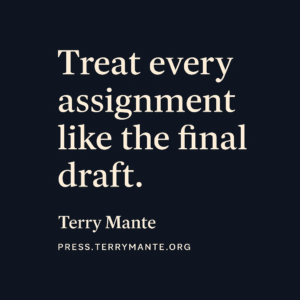
In too many offices, there’s a quiet but dangerous assumption lurking in the background: “It doesn’t matter how well I do this — my boss will fix it.”
Whether it’s a poorly written report, a half-baked presentation, or an incomplete spreadsheet, some employees approach their assignments with just enough effort to say, “I tried.” But trying isn’t the same as delivering. And knowing someone else will clean up the mess is not an excuse for mediocrity — it’s a sign of professional laziness.
This mindset not only undermines personal growth but also erodes trust and productivity in teams. Every time a supervisor has to redo sloppy work, it costs time, money, and morale. When employees adopt a “close enough” attitude, the entire organization pays the price in delays, inefficiencies, and missed opportunities.
Finishing what you start and doing it well isn’t just a favor to your boss; it’s a declaration of your own professionalism. It’s how you build credibility, earn trust, and position yourself for greater responsibility. Mediocrity might get you by in the short term, but excellence is what gets you ahead.
The Cleanup Crew Mindset
When you consistently depend on your supervisor to refine your work, you’re not just wasting their time — you’re stunting your own growth. You’re saying:
- “I don’t need to learn this properly.”
- “Someone else will take responsibility.”
- “Good enough is enough.”
But here’s the hard truth: “Good enough” is never good enough in a competitive environment.
Every project you handle is a reflection of you. And when you consistently send out sloppy work, you’re silently branding yourself as unreliable, careless, or unprepared — even if you’re smart and capable. Perception matters.
Excellence is a Habit, Not a Lucky Day
If you only aim for quality when the stakes are high or when your name is going on the final product, then you’re not cultivating excellence — you’re chasing praise. Professionals who go far are those who give their best even when no one is watching, or when someone else’s name is on the final deliverable.
Your work ethic is revealed in the details. How you send an internal email matters. How you format a report matters. How you prepare that first draft — yes, even the “rough” one — matters.
Because the way you do anything is the way you do everything.
Own the Outcome
If your first thought when receiving feedback is, “But you’ll correct it anyway,” then you’ve misunderstood the point of being on a team.
Yes, leaders are there to guide, refine, and improve. But they are not there to carry your weight. Their job is not to babysit sloppy work. Their job is to scale excellence. And you can’t scale what’s broken.
What every leader wants is this: A team of people who take ownership. Who say, “This is mine, and I’ll make it the best I can.”
Imagine a footballer passing the ball too far ahead because “someone else will chase it.” That’s how some employees treat their tasks — kick it forward and hope someone picks it up. That’s not teamwork. That’s evasion.
Treat Every Assignment Like the Final Draft
You don’t have to be perfect. But you do have to be intentional.
Treat every brief, every presentation, every email, every deck, every report as if it’s the final work. Ask yourself:
- Would I be proud if this went out as-is?
- Would I be confident to defend this in a meeting?
- Would I want to receive this as a client?
That mindset shift is what separates average staff from indispensable team players.
Let Your Work Speak
Benjamin Franklin said, “Well done is better than well said.” Let your work speak so clearly that it doesn’t need someone else to translate it. Take responsibility. Deliver with care. And give your boss less to fix; not because you fear them, but because you respect your own standards.
Remember, you don’t rise in your career by being easy to correct. You rise by being reliable, prepared, and excellent consistently.
——Bottom of Form

About the author
Terry Mante is a thought leader whose expression as an author, corporate trainer, management consultant, and speaker provides challenge and inspiration to add value to organizations and position individuals to function effectively. He is the Principal Consultant of Terry Mante Exchange (TMX). Connect with him on LinkedIn, Facebook, X, Instagram, Threads and TikTok @terrymante and www.terrymante.org.
The post Insight Forge with Terry Mante: Don’t pass the buck; finish it well appeared first on The Business & Financial Times.
Read Full Story

















Facebook
Twitter
Pinterest
Instagram
Google+
YouTube
LinkedIn
RSS